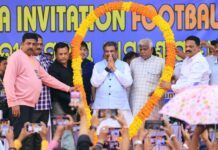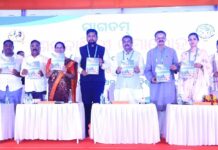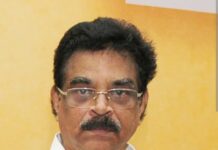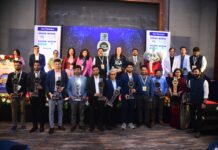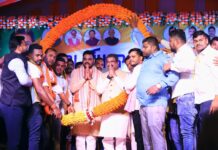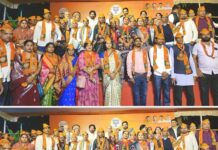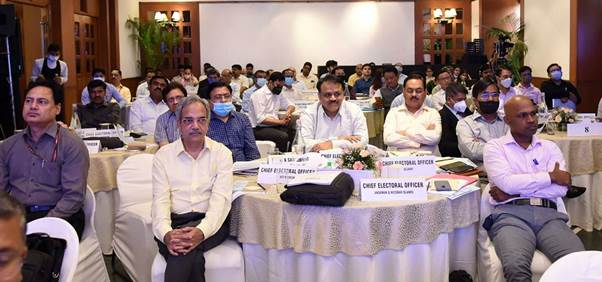By Our Correspondent
NEW DELHI/BHUBANESWAR: The Election Commission of India today organized a conference with the Chief Electoral Officers of all States/UTs in New Delhi. The two day conference is organised to share experiences and learnings from recently held State Assembly Elections in five states along with thematic discussions on election planning, Expenditure monitoring, Electoral Roll, IT Applications, Data Management, EVM/VVPAT, timely resolution of grievances, SVEEP Strategy & Voter Outreach, media and communication.
During his address, CEC Shri Sushil Chandra said that such conferences are an excellent platform for sharing experiences and learning from each other. While complimenting the Chief Electoral Officers, he added that these five states’ elections conducted amidst the pandemic were exemplary and had no previous examples or references. The extraordinary circumstances demanded extraordinary solutions from banning physical rallies, promoting digital campaigning and weekly reviewing the situation with critical stakeholders.
CEC Shri Chandra stressed on the need to continuously upgrade the services for voters through the entire election process, right from registration to voting. Elaborating further, he mentioned that CEOs are the face of the Election Commission of India in the States. and should ensure that they are accessible and visible to all stakeholders. While narrating instances, he urged CEOs to provide regular feedback to the ECI for systemic improvements and improvising voter facilitation.He urged CEOs to strengthen their outreach and communication to showcase their best practices and innovations in election management to the world.
CEC congratulated EC Shri Rajiv Kumar who has been appointed as new Chief Election Commissioner. He wishes that ECI attains greater heights under his leadership.
Election Commissioner and Chief Election Commissioner designate Shri Rajiv Kumar while interacting with the Chief Electoral Officers said that with the mandate provided by the Constitution, ECI has developed extremely robust internal mechanisms and practices to ensure that elections are conducted in a free, fair, accessible and participative manner for each and every voter. With a legacy of the past seven decades, ECI has established exemplary vibrant and transparent processes for other democracies. While narrating his experiences of conducting elections for the first time amidst the pandemic in Bihar till the recently held Assembly Elections in the five states, he mentioned that the journey has been full of challenges and learnings. He added that the unprecedented situation demanded dynamic decision making and pre-empting the misinformed narratives. He urged CEOs to carry forward the journey of reforms initiated during the tenure of Shri Chandra for further streamlining the election processes.
During his address Shri Kumar added that while technology has been leveraged in a big way to enhance the accessibility and transparency of the election system, ECI has streamlined the entire IT infrastructure with focus on three critical stakeholders, namely voters, political parties and election management functionaries. He urged CEOs to strengthen their IT systems including training of the IT personnel for adapting to the latest advancements.
Election Commissioner Shri Anup Chandra Pandey in his address highlighted the agenda for CEOs for next few months including arranging logistics in states for upcoming elections for the office of President of India. He said that CEOs should utilise this lean period to strengthen and upgrade the fundamental features of the election system including updating the electoral rolls, infrastructure upgradation at polling stations, EVM-VVPAT storage and maintenance and training and capacity building of officials. He also asked CEOs to implement innovative SVEEP strategies to better connect with the voter.
Shri Pandey while complimenting CEC Shri Sushil Chandra for his leadership in steering the Assembly elections during difficult and challenging times amidst the pandemic, added that the handling of elections in India during the pandemic has been acknowledged internationally.
Secretary General Shri Umesh Sinha in his welcome address stated that this conference is a medium for us to reflect on our past experiences and new learnings. He added that the recent elections during the pandemic has brought a paradigm shift in conduct of elections for the whole world, with COVID-19 protocols becoming an integral part of the system.
During the conference the Commission today released the latest edition of ECI magazine ‘My Vote Matters’. This edition of the quarterly magazine includes a host of articles on the initiatives and endeavours undertaken by the five poll-gone states in 2022 and election stories from the field.
The Commission also released the Election Statistics pocket book. The data presented in this booklet makes an interesting read on the electoral journey made by the country from 2017 to 2021. It consists of highlights of all general elections and elections to Rajya Sabha and Legislative Councils conducted during this period. Election Statistics Pocket Book has been a regular publication of Election Commission of India since 2014 providing data on Indian Elections in simplified form.
Along with the ‘My Vote Matters’ and the Election Statistics pocket book, the Commission also released the reprint of the Narrative Reports of Second to Seventh General Elections held between 1957 till 1977. The narrative report is a comprehensive document that has captured all the untiring effort of the Commission in making Indian elections free, fair, participative and inclusive
CEOs of the five poll-gone states gave a brief presentation about their experiences, learnings and innovative practices they adopted during the recently held state assembly elections.
The conference was attended by Chief Electoral Officers from all States/UTs, Senior DECs, DECs, DG and other senior officers from the Commission. A separate discussion on Systematic Voters’ Education and Electoral Participation (SVEEP) strategy is also scheduled along with a visit to the newly launched Integrated Election Complex in Bakhtawarpur on the second day.



